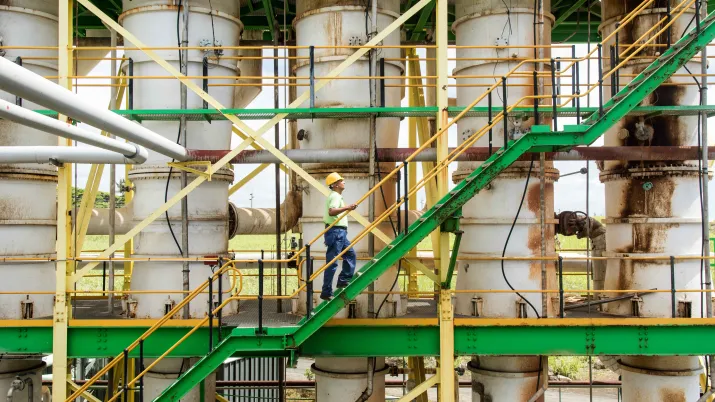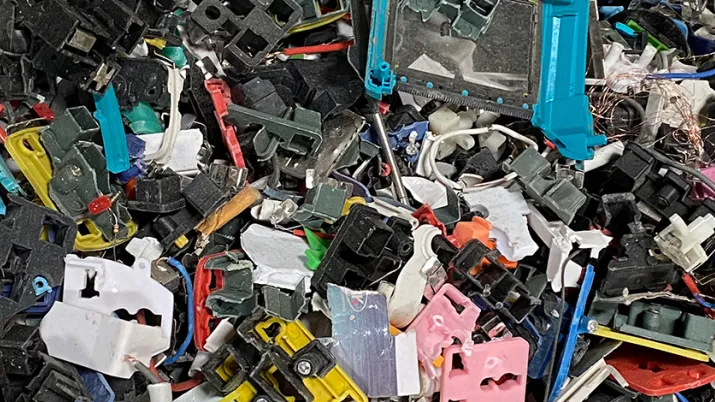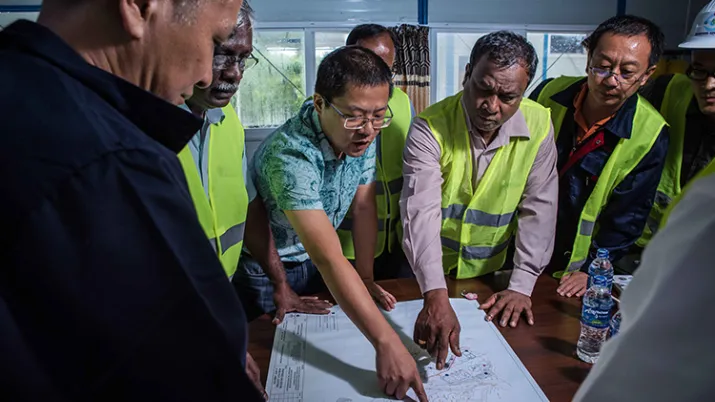Share the page
Advancing the circular economy in sustainability
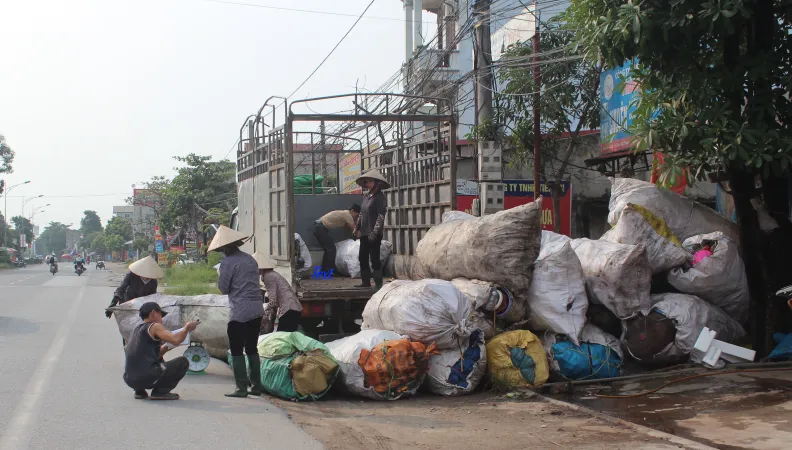
Our planet has a finite supply of non-renewable resources. At the current pace of natural resource consumption, the Earth’s ecosystems cannot regenerate fast enough.
Likewise, the capacity of ecosystems to absorb pollution and waste from human activity is limited. Yet global waste production is increasing exponentially. The figures are alarming:
- 460 million tonnes of plastic waste are generated each year, polluting primarily terrestrial environments
- 15 tonnes of plastic are dumped every minute into the ocean, where plastic debris accounts for 85% of pollutants
- Without effective new control measures, plastic production could double in 20 years and marine plastic waste could triple by 2040
- The construction sector accounts for 50% of extracted resources and 35% of waste in Europe
- Over 92 million tonnes of textile waste are produced annually, with the fashion industry responsible for 10% of global CO2 emissions
7.2% Only 7.2% of global resources currently go back into the circular economy, down from 9.1% in 2018
As France’s development cooperation agency, we are committed to promoting the circular economy and supporting our partner countries in implementing public policies grounded in circular economy principles.
(Circularity Gap Report 2023)
Our strategic priorities
In the context of climate change largely driven by human activity, a rapid transition to a green and circular economy is essential. This shift requires major changes in production, employment, education, public policy, and taxation to ensure a sustainable future for all.
Our work to promote the circular economy in sustainability focuses on two key areas:
1. Tackle land and marine pollution
To improve living conditions and protect ecosystems, this strategic priority aims to reduce pollution at the source – especially from plastic, industrial, agricultural and domestic waste.
To do so, we must establish effective waste management systems, regulate polluting activities, promote waste valorisation through circular economy and recycling models, support inclusive environmental governance, and raise awareness among the general public and local authorities.
The goal is to prevent soil, freshwater and marine degradation while fostering locally adapted sustainable and innovative solutions.
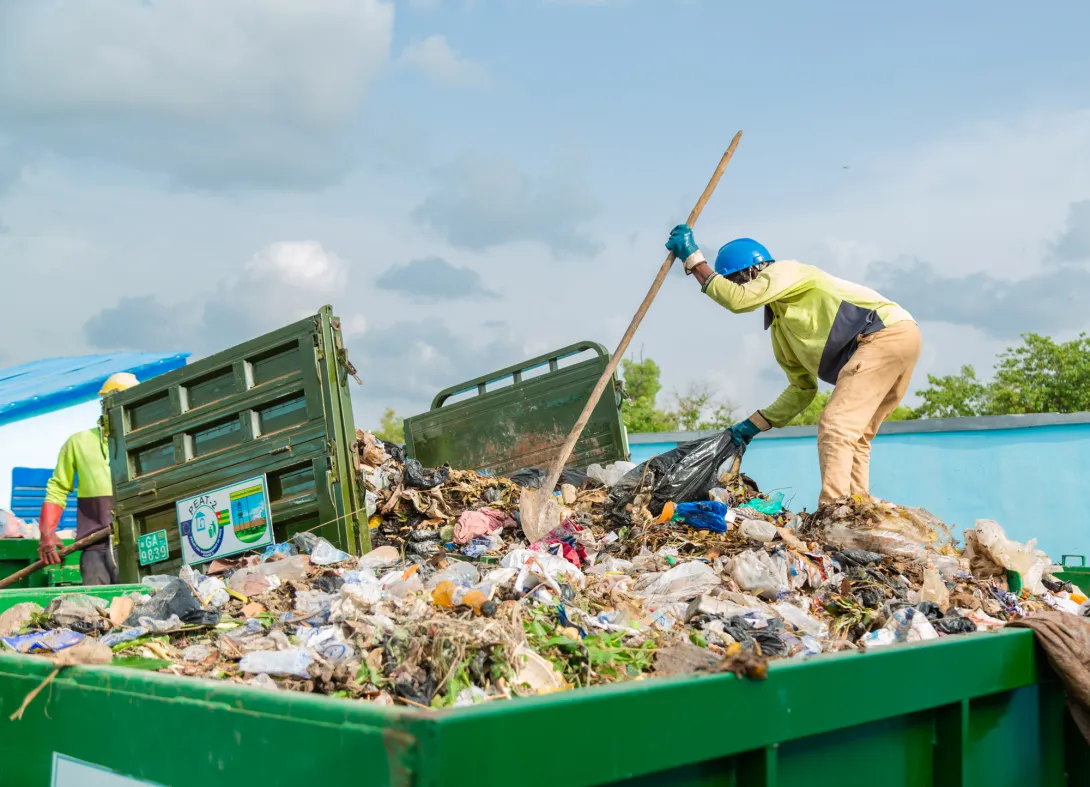
2. Support the transition to an inclusive circular economy
To support strategies and investments that promote a circular economy, we help our partner countries and organisations to transform production and consumption models and ensure inclusive benefits for all, including vulnerable populations.
This is achieved by adopting ambitious public policies aligned with international commitments and adapted to local needs. It is also key that we stimulate sectors such as recycling, reuse, repair and eco-design.
By creating regulatory incentives, facilitating access to green finance, and encouraging public-private partnerships, this approach fosters a circular economy that creates decent jobs, social cohesion, and local and regional resilience.
“Bringing plastic pollution into the conversation helps us rethink how we consume and perceive waste. The circular economy starts with prevention and reduced plastic production, not just waste management. It’s this broader vision we aim to promote.”
- National coordinator for the Rethinking Plastics – Circular Economy Solutions to Marine Litter project in Vietnam

Our framework for action
Our work aligns with several Sustainable Development Goals (SDGs). It aligns in particular with SDG 12, which encourages responsible consumption and production, SDG 13, which calls for urgent action to fight climate change and its impact, SDG 14, which aims to preserve life below water and promote more sustainable fishing practices, and SDG 15, which aims to preserve and restore terrestrial ecosystems.
We also support the United Nations Environment Programme (UNEP) “Fighting Against Plastic” initiative to reduce plastic waste, and we align our work with EU priorities for the green transition and circular economy in sustainability in line with the Paris Agreement.
Lastly, we work towards the goals of the European Commission and its European Green Deal, which aims to establish legal measures and political initiatives in energy, industry, transport, biodiversity and agriculture.
Our services in this area
Despite considerable efforts on behalf of certain countries, the implementation of circular economy principles at a political, legal and industrial level remains limited due to governance issues, regulatory gaps, and limited private sector engagement. Some regions face the dual challenge of promoting growth while ensuring sustainability.
Our agency promotes the circular economy through three main services:
- Strengthen institutional and regulatory frameworks: We assist national authorities in coordinating stakeholders to design or update anti-pollution strategies, promote knowledge sharing on the circular economy, and develop public policies to harmonise and reinforce measures to reduce pollution and define a legal framework to encourage circularity. We also work on raising awareness and reinforcing the technical capacities of stakeholders by encouraging Extended Producer Responsibility (EPR) schemes.
- Implement the circular economy at local level: We support local authorities in deploying circular strategies at a local level through sector audits, co-developed action plans, and tailored solutions. Our work also focuses on reinforcing local ecosystems, raising awareness, and strengthening recycling, reuse and repair systems. Additionally, we foster the circular economy in sustainability hubs such as repair cafes and reuse centres.
- Transform production systems and support change in consumption patterns: We support our partner countries and organisations in strengthening the capacities of stakeholders and professional groups to establish regulatory frameworks and integrate circular criteria into investments and programme financing. Our projects also focus on raising awareness about the challenges of overconsumption, promoting responsible consumption practices, adopting short supply chains, and using renewable and recycled resources. Additionally, our projects may contribute to developing information campaigns on the importance of sorting, reusing, and recycling. Lastly, we support local civic initiatives that promote responsible and sustainable behaviours, particularly through innovative solutions such as the functional economy (rental, sharing, maintenance) and sustainable sourcing.
FAQs
For more about circular economies
The circular economy is an economic model that reduces natural resource consumption and waste production by extending product life cycles. This is done through recycling, reuse and repair as well as by rethinking production and consumption patterns. The circular economy is an alternative to the linear model of “extract, produce, consume, discard”, and it aims to preserve ecosystems and promote sustainability.
In the context of climate change, a rapid transition to a green and circular economy is necessary. The main characteristics of such an economy are:
- Sustainable sourcing: This takes account of the environmental and social impacts of the resources used, particularly as regards their extraction and use
- Eco-design: This takes account of environmental impacts throughout the life cycle of a product and integrates these impacts into the design stage
- Industrial and local ecology: This involves pooling raw materials, energy, water flows, infrastructure, goods and services among economic stakeholders
- Functional economy: This prioritises use over ownership, providing a service rather than a product
- Responsible consumption: This takes account of environmental and social impacts at every stage of the product’s life cycle, whether the purchaser is a public or private entity
- Extending product lifespan through repair, second-hand sales or purchases, donation, reuse, and repurposing
- Better waste prevention, management and recycling
The circular economy model relies on cooperation between public authorities, the private sector and civil society.
The circular economy is a strategic lever to promote sustainable development, as it stimulates growth while preserving resources.
It contributes directly to the achievement of several Sustainable Development Goals (SDGs) established by the United Nations, including:
- SDG 12: Responsible consumption and production
- SDG 13: Climate action
- SDGs 14 & 15: Protection of life on land and below water
The circular economy also supports the creation of decent jobs, reduces inequalities by including vulnerable populations, and strengthens local and regional resilience.
The circular economy supports environmental protection because:
- It reduces extraction of non-renewable resources (raw materials)
- It limits greenhouse gas emissions
- It prevents soil, water and air pollution – particularly through more effective management of plastic and industrial waste and by extending product lifespans
The “Rethinking Plastics” project in Vietnam is a good example of how Expertise France supports circular solutions to reduce marine pollution in seven East and Southeast Asian countries.
The transition to a circular economy involves several key challenges:
- A growing need for action by national and local governments, including laws, regulations, adapted taxation, EPR (Extended Producer Responsibility) schemes, and leadership by local and national authorities
- Involving all stakeholders to enable a real and scalable transition, including citizens, formal and informal private sectors, environmental education, and the scientific community
- Shifting from linear business models (make, consume, discard) to circular ones
Expertise France addresses these challenges by strengthening public sector capacity, structuring EPR schemes, and supporting responsible consumption policies.
Our projects
SWITCH to Circular Economy in Eastern and Southern Africa
Ongoing
2025 - 2029
Funders : European Union, German State
Key figures
- 10 partner countries
- €31 billion in ongoing projects

